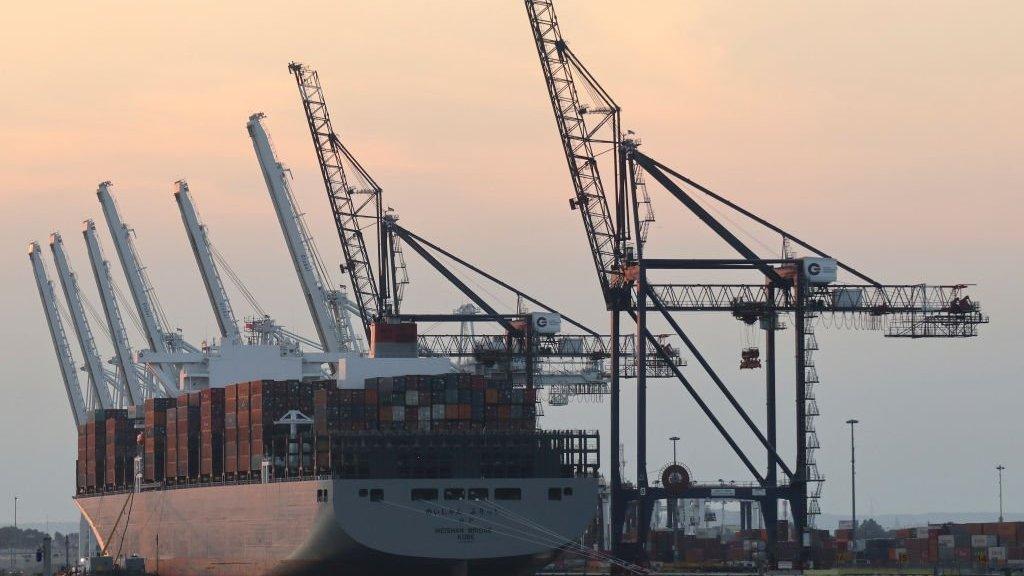What happened to post-Brexit free-trade nirvana?
- Published
- comments
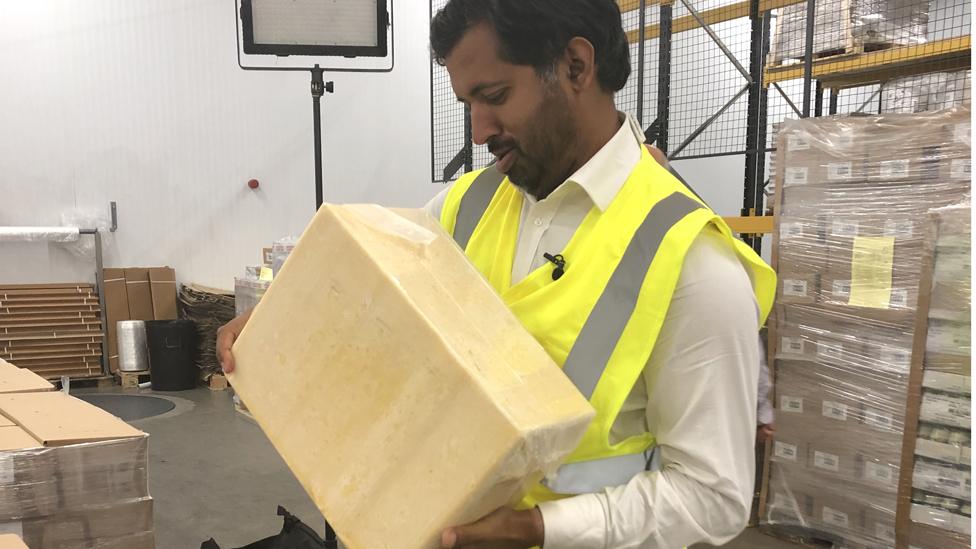
If tariffs on cheddar go up, it's hard cheese for exporters
"There's a tariff of 20% on cars," is the shout at the front of the frenzied room near Westminster, where Trade Secretary Liam Fox and his chief trade negotiator Crawford Falconer look on at what they hope is a next generation of UK trade negotiators.
The sixth-formers of the Harris Academy are used to meeting members of the cabinet: the sixth form is nestled among the ministries. They buzz around exchanging cardboard blue cars for red ones and for Monopoly money, mindful of the negative impact of Britain's terms of trade of a tax on UK exports of its cars.
This is the return of an old dimension to Britain's statecraft and its economic levers.
The hope of Mr Fox and his chief trade negotiator Mr Falconer is that such trade negotiation will offer a new career path for this generation to serve their nation. But it is not just the wheeling and dealing sixth-formers here who are on a steep learning curve.
The Department was set up three years ago, carved out of a wing of what was then Boris Johnson's Foreign Office.
Alongside David Davis at the Department for Exiting the European Union (DExEU), this was the signal of intent from the new administration of Theresa May, Brexit meant the "Three Brexiteers" in charge of "global Britain's" external political and economic diplomacy and negotiations.
Now, in the last days of the May administration, it is only Mr Fox who has remained in post.
He shows me his collection of international trade diplomacy memorabilia: a Stars and Stripes from the US Congress, digitally printed steel from an UK exporter of high-tech metals to India, various sets of cufflinks and his own centuries-old insignia - the flag of the president of the Board of Trade.
Under a very old convention, the Navy are obliged to fly his flag when he is on board one of their vessels, he tells me, and they did in New York last autumn.
But it is his framed copy of the 2016 EU referendum ballot paper that he appears to cherish the most. He picks it up, shows it to me and declares: "To remind us all about our democratic duty to deliver Brexit - this is the spare," he tells me.
Mixed bag
And for many, the entire point of Brexit is what his department has been set up to do - negotiate new trade deals for the UK alone after regaining an independent trade policy.
The record so far has not lived up to the confident predictions made during the referendum about the ease of such deals.
On one level, this is simply down to not having left the EU. But it is also about the continuing uncertainty about the nature of our relationship going forward with the EU. And it isn't even just that.
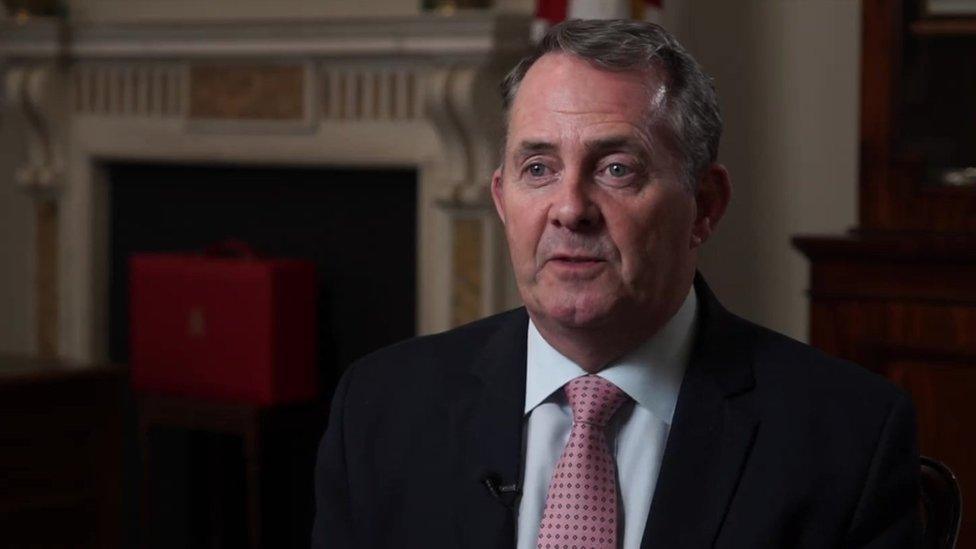
Liam Fox says his department's role is largely to promote exports
When I ask Mr Fox about the rather mixed bag on trade deals, he points out that 80% of what his department does is about promoting exports and inward investment.
And on that measure, £30.5bn extra exports and 50,000 jobs created or protected by his department's promotion of foreign direct investment shows it's value for money.
But on trade policy? "We have a whole range of frustrations, you're quite right. Every time we have to play Grand Old Duke of York once again and we have to march our trading partners up to the point of no deal and then it comes back down again. It frustrates them and it frustrates us.
"We aren't able to negotiate any new trade agreements until after we've left the EU, so we get ready for the point of exit and twice it hasn't come, so we're better prepared than we were, the country in general is better prepared than we were, but there are still legal hurdles we have to get over if we want to get new trade agreements," he tells me.
Whack-a-mole
But it isn't quite as simple as that. In lieu of the actual big new trade deals that have to wait until after Brexit, the department has focused on the important work of keeping the existing terms British businesses enjoy as part of the European Union, with 70 countries through 40 EU deals.
Only 12 have been "rolled over". South Korea was an important success. It signed up partly to protect its car exports to the UK from the imposition of a 10% no deal tariff, but also to gain first-mover advantage on Japan.
But this is trade whack-a-mole - the same publication of the no-deal tariffs in March also led the Canadians to calculate they simply did not need to accept the UK offer of a continuity deal at all.
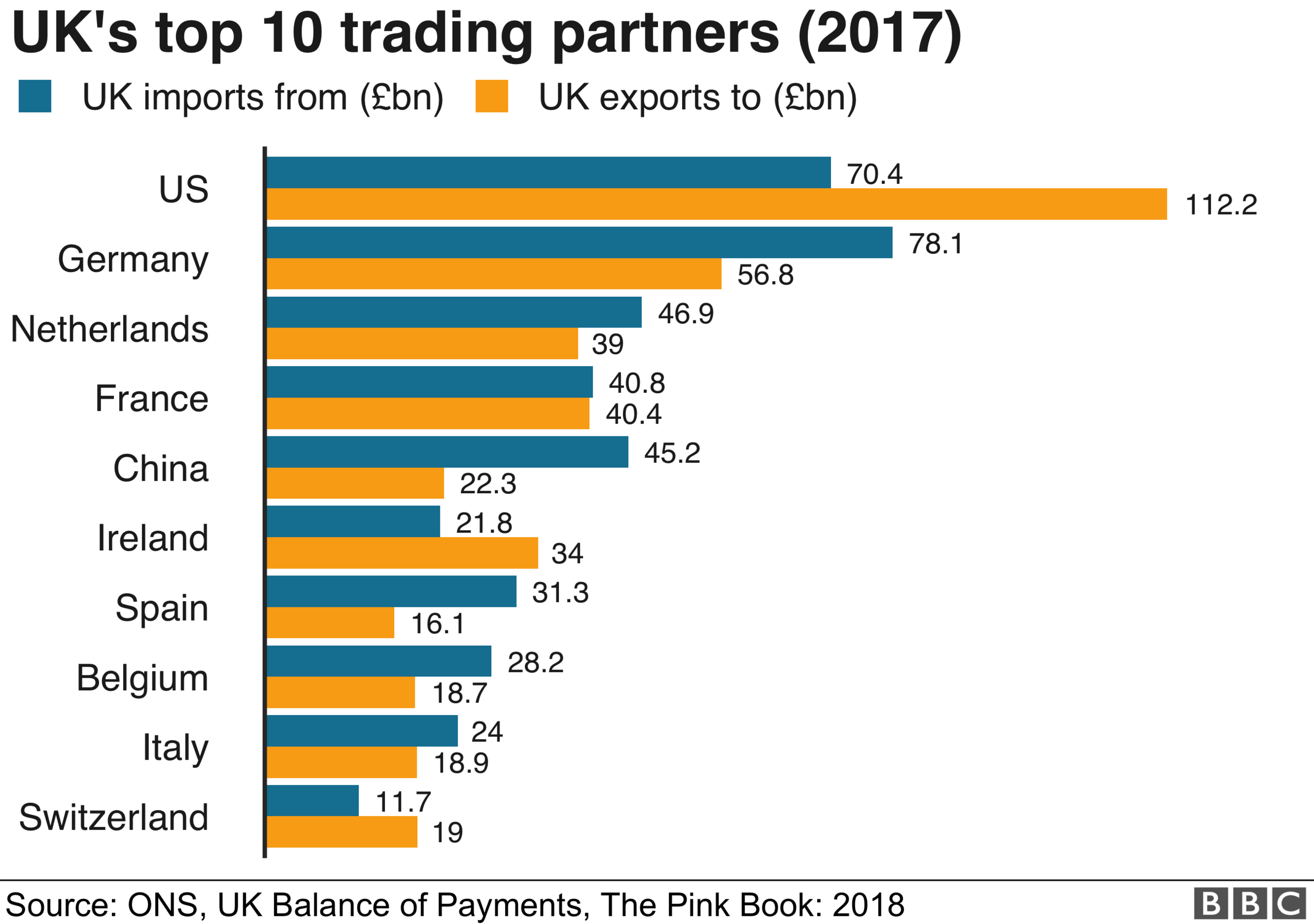
There is a separate but related "Rules of Origin" problem too.
EU manufacturers have been told by their governments that UK parts will not count as "made in the EU". If they use too many UK parts, their products risk not qualifying for tariff-free treatment when exported to those same countries such as South Korea.
Those supply chains, manufacturers say, are beginning to break. Even rollover deals can't really help here.
Exporters cheesed off
The impact of all this can be seen at Combe Castle dairy exporters in Melksham, Wiltshire. "It's a disaster," Peter Mitchell, the operations director tells me.
Just under a third of its business is exporting cheese to Canada, zero-tariff under the EU-Canada Ceta deal. He points to a giant block of cheddar worth about £500 in sales, just about to be shipped to Toronto.
The tariff under no-deal Brexit, now that the Canadians have turned down a rollover continuity deal, is an incredible £1,200 or 245%.
Their cream products face an increase from 0% to 293%. This is literally what trading on WTO terms means for a business that has successfully exported globally for three-and-a-half decades.
He questions whether cabinet ministers really understand the detail. The PM's trade envoy to Canada, Andrew Percy MP, resigned on Monday for other reasons. But he was known to be frustrated by the impact of no-deal tariffs on the rollover. One calculation is that it will lead to £800m in lost business for UK exporters.
The trade secretary acknowledges that Canada did not need to do a deal, but warns them that a new UK administration could change the no-deal tariffs only recently announced.
"In the case of Canada, we set out what would be emergency Day 1 [no-deal] tariffs, which allow 87% of goods coming into the UK to be tariff-free," says Mr Fox.
"The Canadians not unreasonably said, why should we put even more resource into a trade agreements when we can get access to your markets for nothing. The point here is they are temporary, and we will have a new PM and a new cabinet and they may take a different view on that.
"My advice to my Canadian colleagues and others is, get the safety net in place. Your businesses will criticise you for being over-prepared, but they will criticise you for being under-prepared if the worst happens and we introduce trade frictions that wouldn't otherwise be there."
Tariff mystery
Changing the no-deal tariffs, however, risks setting off another round of whack-a-mole. Many retailers, importers and other trade partners have acted and planned on the basis of the numbers published in March.
"Of course they can change. We've made very clear from the outset that these were tariffs that would probably last six to 12 months before the government would review them. And therefore our advice was and is to our trading partners - don't take the risk of there being trading friction that you don't need to have, let's have a continuity agreement," Mr Fox told me.
There has been something of a mystery around how the original no-deal tariffs emerged. They were considered by a cabinet sub-committee, and full cabinet, but there was a not a proper and full process of consultation with tens of thousands of affected businesses, nor a real debate about their impact in Parliament.
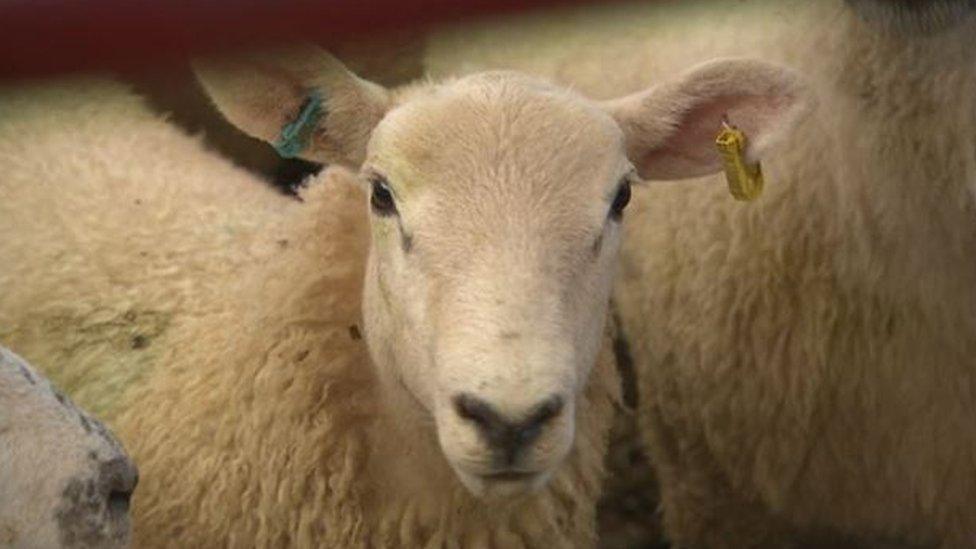
Some Commonwealth allies pushed back against sharing out existing EU quotas, fearing a restriction on their exports of lamb and beef
Mr Fox says they were designed to keep price rises down and protect some selected businesses from foreign competition.
"The no-deal tariffs we set out were designed to not produce an inflationary shock to the UK, because we had to ensure that people on lower pay would not find their wages bought less in the shops, so that was the main priority of the government," he says.
"And we wanted to ensure that these goods that come to the UK and then incorporated into our exports don't become more expensive and make us less competitive. Clearly there are some of our industries that need protecting - we've looked at ceramics and elements of farming that we will need to continue to give protection."
They have also tried to keep trade preferences for developing countries. But that has led to odd distortions, with retailers pondering why men's shirts will have a tariff of 12%, but women's blouses 0%.
Predictable outcome?
The department did make quick progress with the regularisation of the UK's membership of the World Trade Organisation. But then some countries, including Commonwealth allies, pushed back hard against the exercise to share out existing EU quotas, fearing a restriction on their exports of lamb and beef.
Mr Fox says "very few countries objected" to the laying of the new UK goods schedule - the list of applicable tariffs - and that there are now "some small details on access to quotas" which are currently being dealt with at the WTO.
One nation objected to the services schedule - Russia. "It was hardly a big surprise to us. all these things happened within the predictable range."
Is this not the fundamental predictable outcome of trying to do trade deals with the whole world at the same time, at a time when they know the UK government is desperate to do so?
Mr Fox says no, that in terms of the new trade deals, that can only get going after the UK has left the EU and its Common Commercial Policy, "We are only going to do three - the US, Australia and New Zealand."
The government has also consulted on joining the rebranded Trans-Pacific Partnership, the CPTPP, but "that's not possible to join because all the countries there have not yet ratified it".
Transatlantic tussles
The US deal is another story. But Mr Fox has sought to calm down the haste over a transatlantic deal, which he wants "as soon as possible".
ASAP has "a number of logistical wrinkles", he says, principally that the US will be in the final year of a presidential term "when it is notoriously difficult to get the attention of the Administration".
"It's also the position now in the US that the Democrats have a majority in the House of Representatives and might not want to give the president a trade agreement this side of a presidential election. So there are a number of real-world problems."
He also acknowledged other geopolitical issues in the US-UK relationship. The role of Chinese telecoms provider Huawei, the UK tech tax, even the leaked cables from resigned former ambassador Sir Kim Darroch have all complicated the relationship.
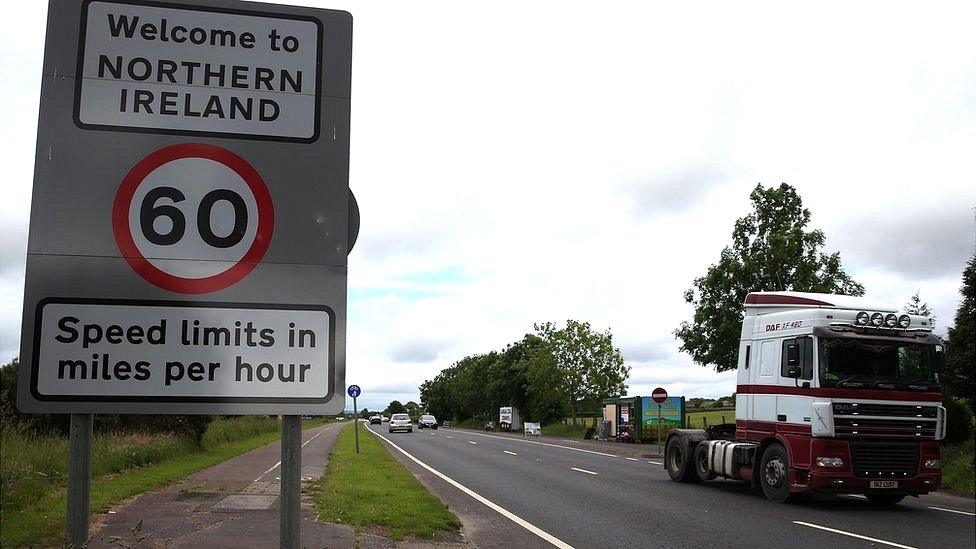
The Irish border is 310 miles long
Mr Fox also revealed to BBC News that those Democrats in Congress had raised a specific and very thorny issue with him at a meeting in Washington DC this month.
Asked whether the government was conscious that Democrats in the key committee were saying they could block a US-UK trade deal if there was any impact on the Irish border or Good Friday agreement, the Trade secretary replied: "We need to be aware of it - I spoke to a number of the Democrat members of the Ways and Means committee [a key Congressional committee with oversight on trade deals] when I was in Washington two weeks ago and they did raise those issues with me,
"I was able to reassure them that both the UK government and Irish government do not want any hard border infrastructure at all to be in place, so I think they will wait and see."
A member of the US Congress confirmed to the BBC that several Democrats on the key committee raised the same point directly to the trade secretary that they would block a US-UK trade deal which saw any hardening of the Irish border.
For many of the keenest advocates of junking the Irish border backstop, and leaving the customs union and single market, the entire point is to do a quick free trade deal with the US. So the clearly articulated prospect of a Congressional quagmire creates rather a paradox.
Choppy waters
All of this occurs against the backdrop of choppy global trade waters, with the US squaring up to China, and to some degree the EU too.
The UK does not expect and is not getting favours. Trade deals are about brutal self-interest. Eventually they can and will be done. But there is little doubt that the ease, comfort and generosity of the rest of the world was oversold.
Boris Johnson himself will remember necking some peach juice from Fukushima for his then counterpart the Japanese Foreign Minister's Twitter campaign to demonstrate safety of produce from the area of the nuclear power disaster.
The UK, at the time seeking a Japanese deal, agreed to lobby the EU to lift its ban on produce from the area. There may be many more such examples to come.
Does the Trade Secretary himself acknowledge it's been much harder to do these deals than sold? "I'm not sure harder, but it's certainly more complex and it's also more interesting," he says.
He says as the UK leaves the EU, it does so more confidently and optimistically than he could have imagined at the time of the referendum. "But we have to do it with our eyes open and understand the problems as well as the opportunities that we might face."
The fledgling Department of International Trade certainly has had a number of wins. But it was never going to be easy to do even the basic rollover deals, and certainly not as easy as some of his political colleagues had claimed.
Matters may not settle for a while yet, as the high-level trade-offs over trade policy become very high politics indeed.
- Published26 January 2024
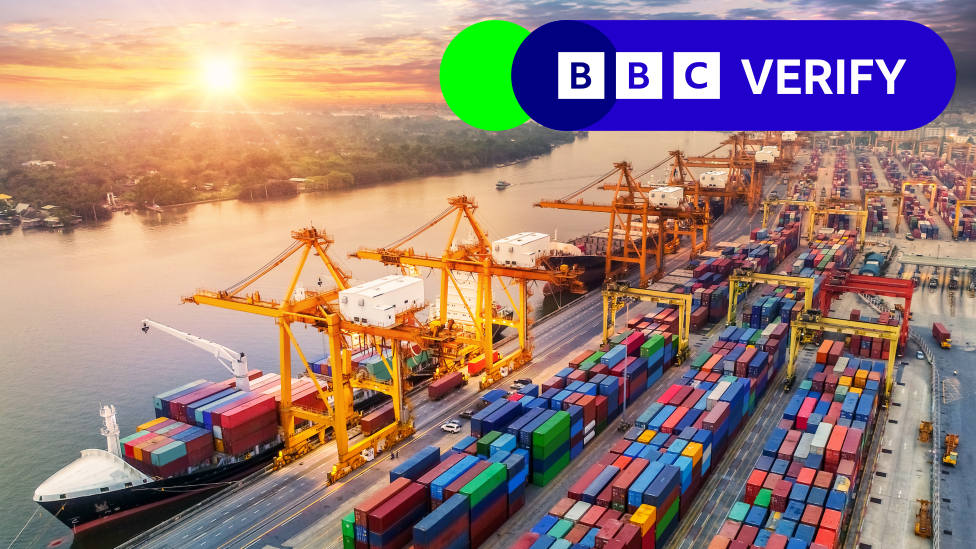
- Published13 December 2020
